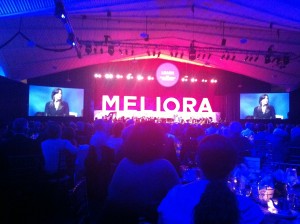
Courtesy of Bradley Halpen - Senior Staff
UR President Joel Seligman announced UR’s most extensive capital campaign to date, The Meliora Challenge, on Friday, Oct. 21, at a special event held in the Robert B. Goergen Athletic Center. The event was attended by those closest to the campaign, including leaders and donors, as well as various University officials.
“Let there be no delusions,” he said. “These aspirations truly do aim high. They are not easy, automatic or yet achieved. But the history of our University is the history of Ever Better … This campaign will help provide the resources to reach our potential.”
The goal of the campaign is to raise $1.2 billion by June 2016. This total will then be split between five different categories — faculty, students, programs, the annual fund and facilities — ranging in allocation from $120 million towards facilities to $375 million to be given to programs.
Additionally, the University plans to increase the number of incoming students to 1,250 by 2016. This increase is part of a strategic plan approved in 2008 that coincides with plans to build new dorms, renovate dining facilities and add more classrooms, labs and faculty offices.
Although the campaign has only just entered its public phase, it has been in the works since Seligman began his tenure as UR President in July 2005.
Up until Friday, The Meliora Challenge was in its “quiet” or “nucleus” phase so that when the campaign was announced to the public it would, according to Senior Associate Vice President for Advancement Jonathan Schwartz, “enter the public phase with the endorsements of [our] strongest supporters and momentum to inspire many more to participate in the effort.”
It was determined that the campaign would be announced on Meliora Weekend because the entire University community would be gathered together at one time. A meeting of the University Board of Trustees had also been scheduled for the same time.
“[Meliora Weekend] provided the best platform to communicate to all of these audiences about our campaign,” Schwartz said.
The campaign is broken up into goals that fall under the four tenets of UR’s new mission statement: learn, discover, heal and create.
“Learn” comprises endeavors to grow UR’s endowment, as well as its ability to supply undergraduates and graduates the necessary scholarships and fellowships to attend UR. It also includes the new Raymond F. LeChase Hall, which will house the Margaret Warner Graduate School of Education and Human Development, and plans to purchase new materials for the library and support new programs like global studies and digital media studies. It also includes plans to improve athletic and fitness facilities, including a renovation and expansion for Fauver Stadium.
Under the umbrella of “discover,” UR lists such goals as investing in endowed professorships, establishing a Center for Energy Research and Education — which will contribute to research in alternative energy and the creation of a national policy — supporting research in massive computing power, a new science and engineering building, and strengthening Centers of Excellence at the William E. Simon Graduate School of Business Administration.
“Heal” covers plans for a new hospital solely for infants, children and adolescents costing $134 million, an expansion of the James P. Wilmot Cancer Center and research at the Aab Cardiovascular Research Institute and the Ernest J. Del Monte Neuromedicine Institute.
Lastly, “create” includes a new Center for Music Innovation at the Eastman School of Music, funding for a new sculpture park as well as improvements to the spaces, programs and exhibits at the Memorial Art Gallery, investments in faculty and encouragement of entrepreneurial collaboration in the fields of entrepreneurship and technology transfer, the planned Digital Media and Innovation Center, as well as support for the arts on the River Campus, including music programs and the International Theatre Program.
The campaign is not limited to just these initiatives, though — in fact, they only represent a sample of what is possible. The distribution of funds will ultimately be determined by the desires of donors. The timeline for all of these goals is flexible depending on the project.
Donations will be sought from any and all individuals with connections to UR — from alumni and parents to faculty and staff — as well as other foundations and corporations, Schwartz said.
“We believe philanthropy is maximized by connecting the hopes, dreams, interests and passions of our current and future donors to the University,” he said.
Strategies to raise funds include one-on-one conversations with potential donors, plus formal proposals and wide-spread appeals.
But is $1.2 billion a realistic goal?
“We have carefully planned for the public phase of the Meliora Challenge and set a goal that is challenging, yet attainable,” Schwartz noted. “Throughout the campaign we will be closely monitoring our progress.”
According to the campaign website, $759 million has already been raised, coming from a wide variety of different donors.
“This is an inspiring reflection of the passion and commitment of our alumni and friends,” Seligman said in his speech on Friday.
The campaign was unveiled to the public on Saturday, Oct. 22 at a Meliora Weekend event called “A Celebration of Meliora,” held on the tennis courts in Goergen Athletic Center.
“This night will go down in history,” Board of Trustees Chair Edmund Hajim ’58 said at the event. “It will be remembered for decades and maybe forever.”
Seligman had a similarly positive outlook. “This is my Meliora moment,” he said as he addressed the crowd.
The event featured a myriad of exhibits highlighting current endeavors from many different schools at UR, as well as entertainment from various University performance groups.
The courts, transformed into a high-class venue complete with “Meliora” spelled out in sky-high, block letters, was jam-packed with people from all sides of the University.
“It’s just seemed to be a wonderful way to categorize different areas of giving,” Schwartz said of the event. “[We wanted] to bring the message to life.”
Goldin is a member of the class of 2013.




